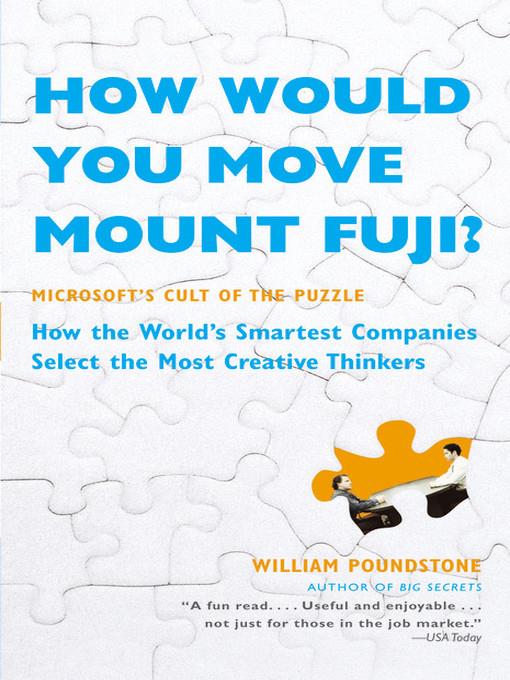
How Would You Move Mount Fuji?
Microsoft's Cult of the Puzzle--How the World's Smartest Companies Select the Most Creative Thinkers
کتاب های مرتبط
- اطلاعات
- نقد و بررسی
- دیدگاه کاربران
نقد و بررسی

April 7, 2003
Anyone who's interviewed for a job at Microsoft is intimately familiar with questions like the one in this book's title. They've probably also pondered such problems as why are manhole covers round? how do they make M&Ms? what does all the ice in a hockey rink weigh? how many piano tuners are there in the world? Questions like these, which test problem-solving abilities, not specific competencies, are de rigueur at job interviews at Microsoft, other tech firms and on Wall Street. In this hybrid book—it's at once a study of corporate hiring, an assessment of IQ testing's value, a history of interviewing and a puzzle book—science writer Poundstone (Carl Sagan: A Life in the Cosmos) explains the thinking behind this kind of interviewing. In straightforward prose, Poundstone describes the roots of logic questions in interviews (the approach appears to have had its modern beginnings at Shockley Semiconductor Laboratory in 1957), drawing on the history of IQ testing in hiring interviews, psychological studies and interviews with Microsoft ex-interviewers and interviewees, makes a strong case for eliminating standard questions like "What are your strengths and weaknesses?" and replacing them with logic puzzles. Almost half of the book is devoted to an "answer" section, where Poundstone gives possible solutions to the brainteasers. Although it lacks a specific focus, this is a fun, revealing take on an unusual subject. (May 1)Forecast: Puzzle enthusiasts, human resources managers and job seekers are a natural fit for this. Ads in
Business 2.0,
Fortune and
Time will target business readers, and an author tour to Los Angeles, San Francisco and Seattle should attract tech-minded buyers.

May 15, 2003
Science writer Poundstone's eight previous books (e.g., Carl Sagan: A Life in the Cosmos; Labyrinths of Reason) are based on a single premise: we can choose to use logic, and society can benefit as a result. His latest book is based on the idea that the way an employer asks questions of prospective employees in the interview process affects the destiny and character of that business. To illustrate his point, he uses Microsoft, a company that has a reputation for hiring the most innovative and intelligent people by putting candidates through their mental paces. Various puzzles (like the book's title) and riddles challenge conventional thinking and allow Microsoft to evaluate how creatively a candidate thinks. This book would appeal not just to employers and human resources professionals but to anyone who loves a good riddle. Consequently, it might be appropriate in a general library, shelved with puzzles and mind teasers. For business applications, it would be appropriate in the human resources or recruiting section of a corporate or business library at the university level.-Stephen Turner, Turner & Associates, San Francisco
Copyright 2003 Library Journal, LLC Used with permission.

























دیدگاه کاربران